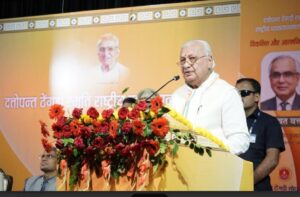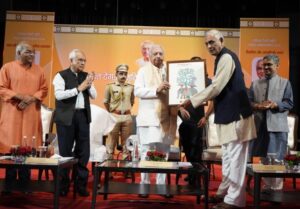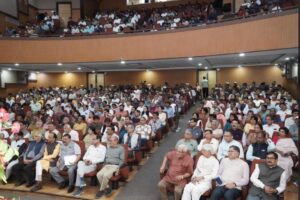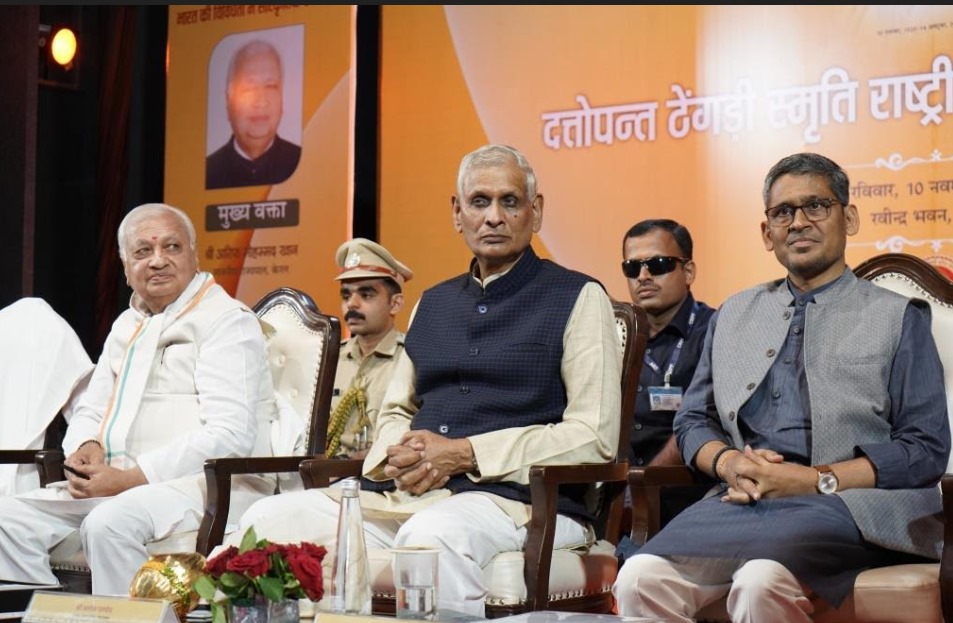CNN Central News & Network–ITDC India Epress/ITDC News Bhopal: At the Dattopant Thengadi Memorial National Lecture Series–2024 held at Ravindra Bhavan on the theme “Cultural Unity in India’s Diversity,” Kerala Governor Arif Mohammad Khan emphasized the timeless knowledge imparted by Indian thinkers thousands of years ago, which laid the foundation of unity in diversity. He stated that Indian sages have provided invaluable insights on harmony within diversity.
Speaking as the chief guest at the national lecture series organized by the Dattopant Thengadi Research Institute on Thengadi’s 104th birth anniversary, Khan remarked that, like deep-rooted trees, certain individuals possess deep dedication. Thengadi, he added, was one such person.

Referencing a Buddhist story, Khan explained that a disciple of Gautama Buddha once asked how to stay true to the path, a concept echoed in the Atharva Veda. This idea aligns with the principle of unity or Advaita (non-dualism). Khan noted that from Adi Shankaracharya to Swami Vivekananda, the philosophies they offered are also reflected in the speeches of Deendayal Upadhyay and were further expanded by Thengadi. None of them, he pointed out, claimed ownership of these principles, as they viewed them as natural and divine insights rather than personal ideologies.

Khan stressed the importance of community, organization, and cultural foundations in maintaining a structured society. While there is diversity in expressions of faith in India, there is unity in belief, which forms the basis for collective unity. He highlighted that India’s greatest ideal is oneness, which empowers individuals to see the unity behind apparent diversity.
Dr. Rajiv Kumar, former Vice Chairman of NITI Aayog, praised Thengadi as a multifaceted personality who shaped society by founding numerous organizations and guiding them with his thoughts. Kumar mentioned that Indian cultural principles offer paths for growth that do not harm nature, as Thengadi advocated for development that coexists with nature. According to Kumar, self-reliance is key to achieving the vision of a developed India. Historically, India was a leader in global trade but faced challenges during colonial rule. To build a prosperous India, he emphasized, the values of self-reliance that Thengadi discussed must be adopted. He also advocated for local and sustainable development rather than blindly following Western economic models.

Kumar suggested that industries should receive support rather than regulation and emphasized that India’s heritage, like Ayurveda, should be cherished instead of being neglected in favor of modern medicine.
Ashok Kumar Pandey, President of the institute, noted that Thengadi was an exceptional leader who established organizations from scratch, helping them attain great heights. He redirected the focus of philosophical thought from Europe to India. Mukesh Kumar Mishra, the institute’s director, spoke about the goals of the lecture series and highlighted Thengadi’s book Kaladrishti, which presents Indian art as a symbol of non-dualism.
#DattopantThengadi #NationalLectureSeries #CulturalUnity







